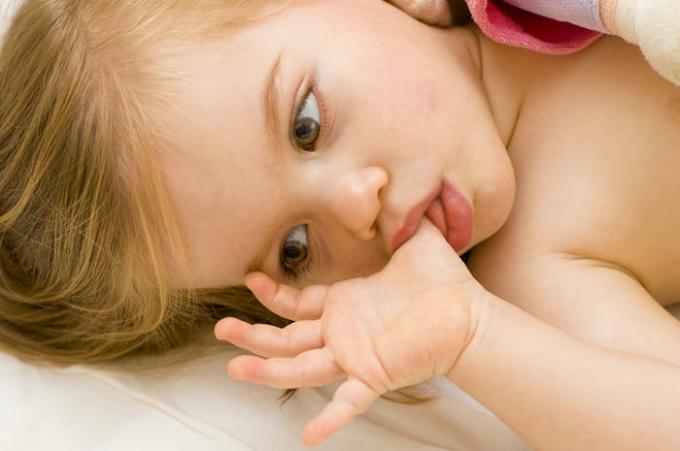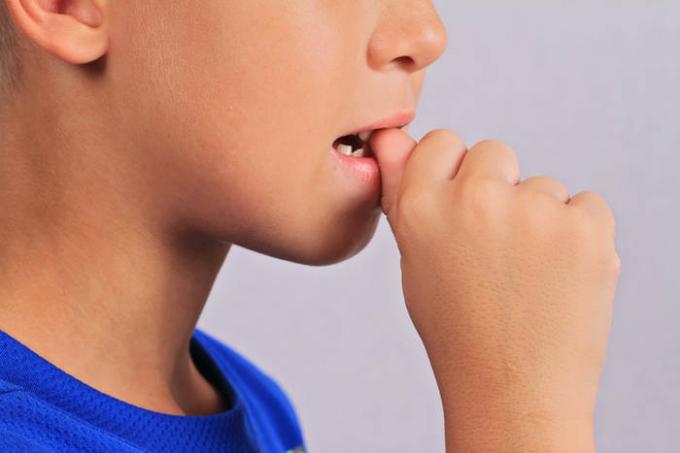What if my child bites her nails or picks her nose? Do I need to punish a kid for bad habits? How to find the cause and help your child get rid of them
Every mom brings up the best child in the world. However, even the best children develop bad habits at times. This is not about smoking, foul language or theft. Now we are talking about such children's "fun" as thumb sucking, nose picking and onychophagia (or simply nail biting). Usually they plunge parents into panic and anxiety “something needs to be done”, because God forbid, the habit will remain with the baby for life. Is it so? What is the child's bad habit signaling to us and is it necessary to fight it? We understand our material.
Baby sucking thumb

Thumb sucking indicates that the child lacks attention / istockphoto.com
Often this habit is developed in children aged 1-2 years. The thumb replaces the pacifier or mother's breast, from which the baby was recently weaned. In this situation, everything is clear: thumb sucking acts as a mechanism to compensate for a reflex, from which the baby has not yet had time to get rid of. Should you panic, smear your child's hands with pepper, bandage your fingers or seal them with adhesive plaster? Psychologists say that in this case, you will only raise the degree of anxiety, and the child will begin to look for a way out for it in other ways.
Try to forget about the annoying bad habit for a while, and increase the amount of physical contact with the child. Take him in your arms, hug, squeeze, stroke his head and hold his hand at any convenient moment. Spend as much time as possible with your baby during quiet times (for example, when your baby is going to bed). It is permissible to "occupy the hands" of a child with a toy that is pleasant to the touch.
As soon as there is an excess of tactile contact and warmth from the mother, the habit of thumb sucking will go away by itself. The main thing is not to focus on this, not to pull the fingers out of the child's mouth and not to commit any actions that will make him feel guilty for this, in general, physiological need.
It also happens that the weaning of the baby from the breast and the pacifier went quite well, and the habit of sucking the thumb appeared in the child a few months later. This means that the child feels unprotected and, subconsciously, again seeks to return to the infant period.
Analyze what could be the reason for this condition of the baby? Did you spend less time with him after weaning? Or maybe thumb sucking coincided with a trip to kindergarten or another stressful situation in the baby's life? The “treatment” in this case will be the same as in the first situation: as much tactile contact as possible so that the child feels safe and under your protection.
Child bites his nails

Child bites nails to avoid increased anxiety / istockphoto.com
This habit is typical for older children (more often preschool and primary school age) and entails a whole bunch of health problems. Not only does onychophagia (as nail biting is scientifically called) destroys the nail plate, and in the future the child may develop a diagnosis such as pathological nail ingrowth. The child bites his nails and "eats" the cuticle unconsciously, so there can be no talk of any hygiene in this case. Therefore, "rodents" are characterized by diseases of the gastrointestinal tract, as well as problems with intestinal parasites.
To beat on the hands, scream and scare with worms in this case is useless. Let us repeat that this habit sits on a subconscious level and looks more like a reflex. By showing you his biting nails, the child most often does not even remember when and in what situation he was doing this bad thing. Therefore, we collect all the nerves into a ball and stock up on patience: since the baby cannot explain why he bites his nails, you will have to find out on your own.
The root of onychophagia is the same sucking reflex, and the cause of its occurrence is anxiety. Due to some circumstances, there is too much anxiety in your child's life. Try to understand what was the trigger for this "rollback to childhood". Maybe the child witnessed your quarrel with your husband, he has problems with adaptation in the kindergarten or school, difficulties with studies, conflicts with peers? Sometimes a psychologist helps to find the origins of anxiety: there is nothing shameful in coming with your baby for several consultations. Only God forbid you to tell the child "now we are going to the aunt who will wean you from biting your nails."
If you want to solve the problem of nail biting yourself, do not focus the child's attention on it. Look for the origins of the anxiety and help him deal with them. If these are scandals in the family, step on the throat of your own song and stop quarreling with your husband in front of the child. If there is a lot of work at school, teach lessons together. If conflicts with peers - talk to the teacher or class teacher, explain the problem and ask for support. Spending time together and doing what you love with your child also helps.
Child picks his nose

Poking your nose can be a symptom of a nervous disorder / istockphoto.com
All ages are submissive to this habit: it can develop in both toddlers and younger students. Bad news: nose picking can lead to health problems, such as frequent viral and bacterial upper respiratory infections. The good news is that the root cause of this habit is easy to find and easy to remove.
The mucous membrane of the nose is very sensitive to all changes in the external environment. Therefore, mucous discharge from the nose (which is always there in small quantities) often dries up, forming unpleasant crusts in the nostrils. They interfere with free breathing, and the baby tries to remove them in an accessible way - with the help of a finger. If you regularly toilet the nose, and teach this to your child, the need to pick it with your fingers will disappear by itself.
In rare cases, rhinotyllexomania (this is what psychology calls the human habit of extracting dried nasal mucus from the nostrils with a finger) can be a sign of a nervous disorder. Psychologists say that she can indicate an SVGD (attention deficit disorder and hyperactivity in children). However, this is manifested not by single picking in the nose in front of the TV, but by obsessive scratching of the mucous membrane. If you notice that your child is overly active in relation to his nose, it makes sense to see a specialist.
You will also be interested to read:
What bad habits will tell in children: 3 unexpected facts
5 bad habits we think are good

